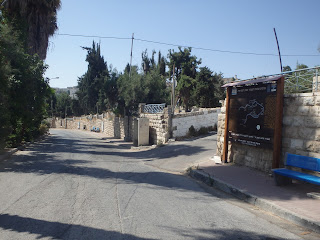A group of us ISMers went on a morning patrol today, going through some areas where we are keeping a presence.
We walked through the Souq (marketplace) where soldiers patrol, though less often than they used to and the shopkeepers report less problems now than before.
We also walked by the Ibrahimi Mosque. It is a place in the city that is holy to both Muslims and Jews, although only the Palestinian Muslims have restrictions placed on them, which include but are not limited to entry being barred for people between the ages of 15 and 18, being searched by soldiers on the way in, and being denied entry for random reasons to their place of worship.
Our route then took us uphill "Prayer Road", which is a place settlers often come down during Fridays to go to the Synagogue (same building as the Ibrahimi Mosque) and on their way sometimes harass Palestinians who live there.
We walked all the way up the road to the entrance of the Kiryat Arba settlement, beside which is a Palestinian neighbourhood. Some of the settlers periodically leave their settlement to try to construct a small synagogue (in the form of a small tent for now) on Palestinian land. The construction is illegal and the Israeli Army's job is to take it down, which they sometimes do and sometimes do not.
Of course, there is nothing wrong with either synagogues or Judaism. The settlers however, abuse this religion by using it to take others' land. If the building is finalized in the Palestinian neighbourhood, it is very much probable that the army will be going there more and more often and pressure will come on the residents there to leave their homes.
I have no idea what this pastry is called but it is a very deep fried dough of some sort that is deep fried that tastes like sugar and honey.
Ibrahimi mosque. The Israeli Army is building yet another gate to add to their already existing checkpoint. It will be yet another obstacle the Palestinian worshipers will need to be able to get through in order to pray.
Palestinians watching the new "security" measures go up.
The home with the black water tanker on top belongs to a Palestinian family. It is just below the Kiryat Arba settlement, which is comprised of the apartment buildings above. Although the Kiryat Arba settlers are less "extreme" than their counterparts from Beit Romano and Avraham Avinu settlement on Shuhada Street, the family still reports rocks being thrown down onto their house.
Kiryat Arba settlement to the right, Palestinian homes to the left. In the centre are trees that belong to the Palestinians, but some report the settlers are trying to take them.
Gate to Kiryat Arba settlement.
The house with the Israeli flags on it is on the Palestinian side, but the settlers now own it and converted it to a relaxation home for Israeli soldiers.
Makeshift synagogue tent that had been set up on Palestinian land by the settlers from Kiryat Arba. Instead of taking it down, these soldiers seem to be guarding it.
Walking down Shuhada Street, which is a street that only Palestinian are not allowed to walk on... including those who live on it. It used to be a place where there were thriving markets and a community, but it had been closed down and now is mostly used by Israeli settlers.
This opening holds very special significance to myself and another ISMer. Last year, during a night patrol of this street, we were chased by 4 masked Israeli settlers. We escaped what I believe would have been a serious beating only by running into this small alley, that leads into a Palestinian neighbourhood. To read the full story, please feel free to check out: http://hungryandthirstyforjustice.blogspot.com/2015/08/the-most-terrifying-moment-of-my-life.html
This is the only part of Shuhada Street that Palestinians are allowed to walk on... although only Israelis are allowed to drive on it, as well as sometimes Palestinian ambulances. However at times, even they have not been allowed to do so without harassment by the soldiers and settlers: http://hungryandthirstyforjustice.blogspot.com/2015/07/israeli-soldiers-delay-ambulance-for.html
The ambulance vehicle in the picture is Israeli. Like Israeli ambulances, Palestinian ambulances and ambulances anywhere in the world for that matter, should be allowed to do their work unimpeded.
Graffiti on a Palestinian home, made by settlers. The inhabitants of these homes have faced and continue to face attacks and harassment from the settlers.
Checkpoint 56
A cute looking puppy foraging for food among garbage. Petting it or getting anywhere near it is not a good idea, as it most likely lives on the street and could have diseases it can easily pass on if it gets frightened and takes a bite.














No comments:
Post a Comment